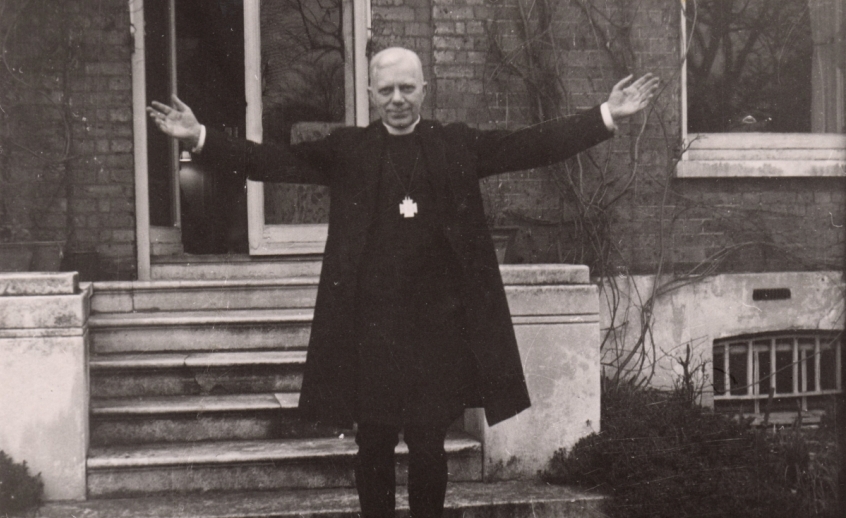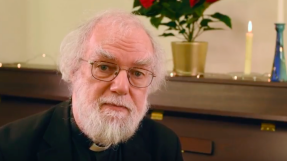There can surely be no middle ground when it comes to sexual abuse: it makes a villain of anyone who perpetrates it.
George Bell was either a giant of the Anglican Church who helped rescue Jewish children from the Nazi regime and, against the grain, heroically opposed the bombing of Dresden, or he was a child abuser and all his achievements are for the birds.
Perhaps that is why the debate, if it can be called that, around the reputation of the late Bishop of Chichester who died in 1958, is so binary, even by the standards of the age of social media.

This stark reality helps explain why so many of Bell's supporters have directed their anger in the aftermath of Lord Carlile's report into Bell at Justin Welby, the Archbishop of Canterbury, who insists that a 'significant cloud' remains over the late bishop's name.
It is worth quoting at some length from Welby's statement which coincided with the release of the Carlile review in December, a statement that he has since refused to rescind.
It said: 'Bishop George Bell is one of the great Anglican heroes of the 20th century. The decision to publish his name was taken with immense reluctance, and all involved recognised the deep tragedy involved... The complaint about Bishop Bell does not diminish the importance of his great achievement. We realise that a significant cloud is left over his name. Let us therefore remember his defence of Jewish victims of persecution, his moral stand against indiscriminate bombing, his personal risks in the cause of supporting the anti Hitler resistance, and his long service in the Diocese of Chichester.
'No human being is entirely good or bad. Bishop Bell was in many ways a hero. He is also accused of great wickedness. Good acts do not diminish evil ones, nor do evil ones make it right to forget the good. Whatever is thought about the accusations, the whole person and whole life should be kept in mind.'
To be fair to Welby, although he has pointed out that his position is supported by the Bishops of Chichester and Bath and Wells, in standing by this statement, even in the face of direct attacks against him from leading academics and historians, he is taking responsibility for the modern-day Church's controversial position on Bell – and seeking to subvert that binary narrative by saying any bad things he did should not entirely obliterate the good.
Welby is surely right to take responsibilty. For the detail of the Carlile report makes it clear that the archbishop himself was involved in the early stages of discussions about releasing Bell's name to the media and public following complaints from the woman known as 'Carol' who claims she was abused by Bell and to whom the Church paid damages of £16,800 in 2015.
It should be said at this point that it is almost impossible to believe that 'Carol' made her allegations up out of thin air. And some of Bell's fiercest critics are surely wrong to traduce her, or claim that the abuse came later than her childhood. But it remains possible of course that she was abused by some church figure other than Bell. We will never know.
Nonetheless, the Carlile report reveals an email from the Bishop of Durham on April 29, 2014 to the so-called 'Core Group' in the CofE, members of which have come under immense strain in recent weeks and who were, after all, amid all the chaos of the modern media age, trying their best to do their difficult jobs.
The email reads: 'Dear All, At the meeting of Archbishops & Diocesans Archbishop Justin decided that he should inform those gathered of the possibility of the name of the person concerned becoming public in due course.'
It was the 'rush' to name Bell, and the very fact of naming him at all in the face of unproven and unprovable allegations, that led Carlile to be so critical in his report.
Arguably, Welby and the Church have since backed themselves into a corner on the case. The archbishop's refusal to climb down, doubtless heavily influenced by legal advice, leaves wide open the question about what is justice for an accused person. There are false and mistaken accusations, but the position still seems to assume that an accusation alone can be taken as almost conclusive.
Of course, the Church must be hyper-cautious following the separate case of the former bishop Peter Ball – and the safeguarding team should be commended for its efforts in recent years -- but the two cases are in fact widely different, as Ball was accused by a significant number of people and accepted his guilt.
Then there is the Church's decision to release yesterday what some see as a cryptic statement saying that it had received 'fresh information' concerning Bell, a statement which left open the assumption that another complainant had come forward, and one that appeared to critics to be a case of 'We told you so'. It is reported that the Church has known about this 'new' information for two weeks, which raises questions, if true, about the timing of the release of the information ahead of General Synod which begins next week and at which Welby is expected to come under fire. More importantly, it also raises the question why Bell has effectively been named again as the subject of an accusation, but this time only weeks after the Church received the information, not years as in the case of 'Carol'.
On the other hand, it is hard not to sympathise with the safeguarding team especially, and even with Welby. After all, the only truth present in this tale with few heroes is that no-one knows whether or not Bell committed the grave sins of which he has been accused. And, as even the leading pro-Bell campaigner Peter Hitchens concedes, if Bell did do it then his achievements are as nothing.
He tells me: 'George Bell's memory is revered not because he was a great artist, the inventor of a drug or medical procedure which transformed the world for the better or a warrior who saved his country from subjugation. Such persons can be to some extent separated form their other deeds because their actions endure in a material way. Bishop Bell's memory is revered because of repeated acts of self-sacrificing goodness, a rare example of a man who placed truth and justice before self. If it turns out that he was in fact a lying traitor, who abused defenceless little children by perverting the Gospel and sought to make them complicit in concealing the crime, then he was not good and his reputation was a shining robe laid over a rotting heap of filth. William Blake reminds us that true good is done in minute particulars. Likewise evil.'
But in the terms of reference, the Church of England constrained Carlile from making a judgment on whether or not Bell was guilty as accused.
All of which is why this argument will, sadly but inevitably run and run.
As the Bishop of Chichester Martin Warner has said: 'The good deeds that Bishop George Bell did were recognised internationally...[and] will stand the test of time. In every other respect, we have all been diminished by the case.'
Like Welby, he is anxious to move beyond the binary split between Bell as hero or Bell as villain. But in this polarised and super-sensitive area, that may not be an option.













